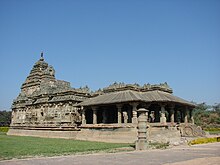| Brahma Jinalaya, Lakkundi | |
|---|---|
 Brahma Jinalaya | |
| Religion | |
| Affiliation | Jainism |
| Deity | Neminatha |
| Festivals | Mahavir Janma Kalyanak |
| Location | |
| Location | Lakkundi, Karnataka |
| Geographic coordinates | 15°23′22.2″N 75°42′51.2″E / 15.389500°N 75.714222°E |
| Architecture | |
| Style | Western Chalukya architecture |
| Creator | Attimabbe |
| Date established | 1007 CE |
| Temple(s) | 1 |
The Brahma Jinalaya, sometimes called as the Greater Jain Temple of Lakkundi, is an early 11th-century Mahavira temple in Lakkundi, Gadag District of Karnataka state, India. The temple is attributed to Attiyabbe (Danacintamani Attimbbe), the wife of the local governor Dandanayaka Nagadeva. It faces east, has a mukhamandapa, a gudhamandapa and its sanctum is covered by a sur-temple style vimana superstructure. The temple is notable for its reliefs depicting Jaina artwork, statues of the Tirthankaras and the two statues of Brahma and Saraswati inside its inner mandapa.[1][2]
The temple was ruined and mutilated during or after the wars of the 13th-century.[clarification needed] It was rediscovered by British archaeologists led by Henry Cousens in "deserted, filthy condition, occupied by a colony of bats" with beheaded Mahavira statue outside. Now cleaned and restored, the Jain temple of Lakkundi is one of many historic Chalukya era Jain and Hindu temples found in Lakkundi. It is the oldest major Jain temple in this region.
Archaeological Survey of India has listed this basadi in the complex in the list of "Must See" Indian Heritage.[3]
- ^ Dhaky & Meister 1996, p. 89.
- ^ Cousens 1926, pp. 77–78.
- ^ ASI must see & Jain Basti, Lakkundi.

